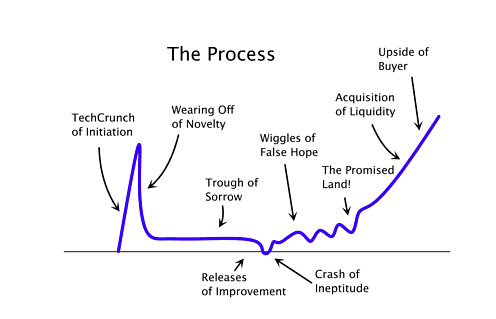There is a myth that the Product Manager is the sole person for the success and failure of a product. It’s been boosted by the concept that PMs are the “mini-CEOs” of a product. After all, the engineering team sees them building the backlog, and the management team sees their reports and revenue. And who doesn’t like the bravado of being the sole person behind a successful product launch?
Bear with me, but there will be times that your product isn’t doing well. When questions arise, your first thought is that you should solve this by yourself.
Don’t. Temper that innate desire to internalize these problems and shoulder them yourself.
When you try to fix things in a void, you’re operating with limited information. When you’re sharing openly, you’ve now opened the doors to new information. Brainstorm with your team and others in your network. Revisit and challenge assumptions (where did that mission statement go?!) Just the act of talking aloud can help uncover new insights. (see: shower epiphany)
For example, you’ve launched a beta of your product but nobody is signing up. You think that it’s not the featureset, but targeted to the wrong market. You could run with the (false) assumption that this market was chosen for a reason and rework your product to fit this market, using precious developer time. Or you could talk with the VP of Product and learn that they hadn’t thought of this different market you’re proposing, and the two of you could do a quick market analysis to validate your thoughts.
Now instead of spending long dev hours reworking your product, you can shift your beta testing to another audience. In addition, the VP now has your back in explaining the focus on a new different market.
MYTH: The product manager is responsible for solving all product problems
FACT: The product manager gathers product insights and works with the team to resolve problems
Gathering information isn’t just markets and users, but information from your colleagues, especially if you’ve inherited the product. If you’re having issues with retention, bring it up with the team. Why was this initial market chosen? How did we validate this initially? You’ll often find that past decisions were made on a hunch, or the previous PM was more focused on hitting a development milestone than market validation.
If you’re still not convinced that the product doesn’t rest solely on your shoulders, take a step back and look at your company. They *want* you and the product to succeed! The CEO, the management team, the development team have all invested time and money. Your manager is directly responsible for yours and other product lines, making them accountable. They want to know ways that they can help and the reason they are coming to you is because you are the closest to the product. So don’t internalize those product issues, and keep those communication channels open!
About the Author


























